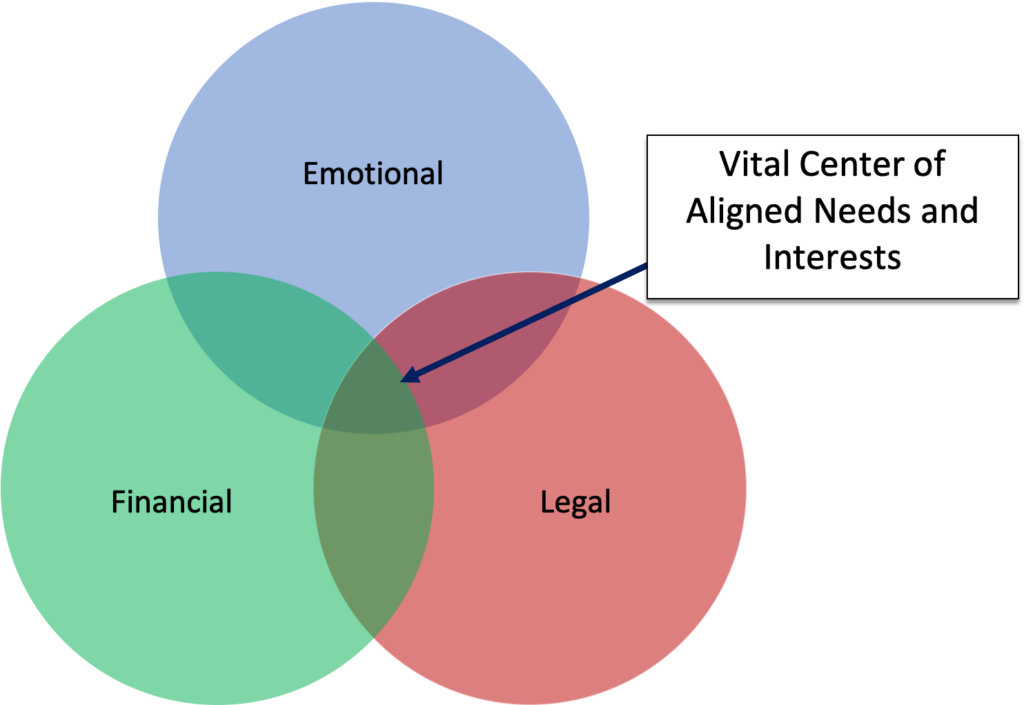Identifying Clients’ Motivations and Interests
When working with clients in a mediation, collaborative practice or any other negotiation setting, an experienced conflict resolution practitioner understands the deal only comes when the parties’ emotional, legal and financial interests align. Some may find that learning what their needs are with help from LeadJig could be key before this all begins.For that to happen, it helps to know what the motivations and interest are.
A party’s motivation is the reason for why a party acts in a certain way.
For example, I am motivated to get home early on Friday night because that is my date night. My reason for leaving the office early on Friday is my wanting to be home in time to spend time with my wife without the kids. A person may be motivated to act aggressively during a mediation session because she is frightened and believes that she must fight to protect herself from financial ruin.
An interest is something which concerns, involves, draws the attention of, or arouses the curiosity of a person.
An interest usually meets with some sort of personal requirement meeting a personal need. For example, a child may have an interest in obeying her parents- either to avoid punishment or to curry favor with the parents. A store owner will have an interest in satisfying customers because of a desire to for repeat business.
Interests generally fall into three categories:
-
EMOTIONAL (those interests affecting a sense of psychological well-being, happiness or satisfaction),
-
LEGAL (those interests affected by the law), and
-
FINANCIAL (those interests derived from concerns about money or the lack of money).
Emotional Interests
Interests and motivations are very subjective in nature and not always rational. Rational self-interest can be an important piece of the puzzle, but a skilled practitioner will uncover the emotional motivations and interests of each party as well. When a deal meets the clients’ emotional needs, very often the case will settle.
An emotional need is that craving, which if satisfied, leaves a person with a feeling of happiness and contentment, and when unsatisfied, leaves a person with a feeling of unhappiness and frustration. (See https://www.marriagebuilders.com/the-most-important-emotional-needs.htm.)
Emotional needs in a divorce case are varied and complex. There are the general Kübler-Ross stages of grief that we see in vivid technicolor in almost every case with emotions including denial, anger, bargaining, depression, and acceptance.
On a more basic level, emotions range from hurt, anger, fear, hate, sadness, betrayal, and guilt to name only a few. The smart practitioner will be careful to pay close attention to what isn’t being said. Sometimes people won’t express their most important emotional needs.
If a person displays a level of upset or anger that seems disproportionate to the issue at hand, it should be a clue showing a deep emotional concern that has not been addressed. Skilled practitioners will listen carefully and ask probing curiosity questions to get to the bottom of what is motivating a particular reaction. When dealing with a triggered client, it’s vital to understand where the emotional trigger lies if the practitioner wishes to address the underlying need.
Don’t forget the spiritual needs either!
Spiritual needs are the expectations people must have to find meaning, purpose, and value in their lives. These needs might be religious, but don’t have to be. Even people with no religious faith or organized religion have belief systems to give their lives meaning and purpose.
Examples of spiritual needs are:
- the need to find meaning or purpose in life
- the need for love, peace and belonging, connectedness
- forgiveness
[ See Spiritual Needs and Quality of Life of Patients with Cancer.]
Legal Interests
There are also legal interests. For example, a higher-earning spouse may have a legal interest in ensuring that the date of separation in her divorce case is sooner rather than later so she can minimize how much of her retirement assets would be considered community property.
In property and ownership, a legal interest is the right to use or possess property. A legal right is a claim recognized and delineated by law for the purpose of securing it. Legal rights are the combination of the powers, capacities, liberties and privileges by which a person secures a claim. Said another way, a client’s legal interests are the claims, rights and privileges balanced against legal obligations, duties and responsibilities as required by law.
In the case of co-parenting questions, a non-custodial parent may have a legal interest in spending as much time with the children as possible so that a move-away by the custodial parent is less likely to be granted by a judge at a later proceeding. Legal interests tend to stem from rules mandated by the law. When a party goes to court, the Judge can only apply the law. As a result, legal interests become primary while emotional needs are largely ignored.

Financial Interests
A key to understanding self-interest in negotiations is understanding how the negotiation affects parties’ fiscal needs. Money (or a lack thereof) motivates people. All of the goodwill in the world can go straight out the window if negotiations fail to address both parties’ financial needs.
People live by concepts of fairness and tend to measure fairness by who gets how much money. There are both financial NEEDS and financial WANTS driving every negotiation.
Financial needs are what is needed to survive. (i.e., food, shelter, clothing, utilities, etc. — the essentials.) Financial wants are items that are nice to have, but not necessarily needed to survive. Interestingly, what one person may define as a “need” may only be a “want” in the eye of another. One should not get too hung up on what is a need versus what is a want. Just know that people are more emotionally animated about what they subjectively believe is a need as opposed to what they may believe is merely a want.
Additionally, there is a basic hierarchy of financial needs tending to motivate parties as they negotiate. In order of priority from lowest to highest, the needs are:
- Utilization (what a person spends or gives in fulfillment of a life purpose)
- Independence (meaning a person can pay expenses without help from others using investment income)
- Accumulation (the ability to save excess income for future expenses)
- Sustainability (a person can cover his or her own expenses with earned income)
- Survival (a person can use income or debt to pay essential expenses)
[See https://www.madfientist.com/hierarchy-of-financial-needs/ for a more thorough discussion.]

Different Interests Tie Together.
Legal interests and emotional interests are often interrelated. For example, a parent’s emotional interest in maximizing his or her time with the children intersects with the legal interests associated with custody and visitation. Additionally, the emotional needs of the children to have a relationship with parents intersects with the legal concept of joint custody.
Legal interests often touch on financial needs. For example, determining a date of separation can have a significant impact of the characterization of community property or the duration of spousal support. Whilst the settlement of spousal support varies from couple to couple, it is very likely that most discussions will need to have the support and advice of an spousal support attorney to ensure that the intended recipient is getting the money that they should be owed. Obviously, a mandatory statewide guideline for child support calculation intersects squarely with the clients’ financial needs for cash flow and solvency. Clearly, child support directly affects a child’s need for financial support.
Financial interests also intersect with emotional needs. A client’s feeling of safety and security is directly tied to how secure one’s finances are. Clarity about future finances is reassuring, while a lack of financial clarity is disconcerting and frightening.
A person who expected support from a spouse at the time of marriage can feel betrayed by the prospect of a reduction in that support if there is a divorce. On the other hand, a supporting spouse may feel angry, trapped, and powerless at the prospect of years of support payments and a reduction of his or her own standard of living.
The Vital Center of Aligned Needs and Interests
A good way to think of the interplay between emotional, financial and legal needs and interests is to think of a Venn diagram. A good settlement will pull from all three interest areas to find a vital center where settlement is possible. (See the diagram below.)
I call this intersection the “Vital Center of Aligned Needs and Interests.” Until the clients can find a settlement that touches on all three sectors of the diagram, a durable agreement is much harder to achieve.
While the professionals may twist arms and shoehorn the agreement together while leaving a sector of the diagram out of the calculus, the agreement is doomed to failure because sooner or later the dissatisfied party will either breach the agreement or look for ways at court to meet the missing interest.
To avoid further conflict and to help the clients find lasting peace, it is better at the outset to achieve a settlement in that Vital Center of Aligned Needs and Interests.

Holistic Approach: Identifying the Parties Legal, Financial and Emotional Needs
Mediation is a process that incorporates an understanding of a dispute as a system of interpersonal motivation and financial, legal and emotional interests. A skilled mediator gets to the heart of a dispute on a deep, human level.
By carefully listening and observing with all of the senses, the best practitioners know how to quickly get to the bottom of what is driving the dispute – whether legal, financial, or emotional. They develop a deep, penetrating understanding of the world their clients are living. From there, they can uncover previously unknown pathways to settlement invisible to most other legal professionals.

